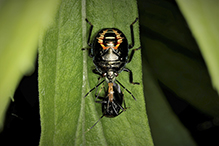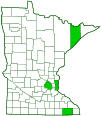spined soldier bug
(Podisus maculiventris)
Conservation • Description • Habitat • Ecology • Distribution • Taxonomy
|
|
||||||||||||||
Description |
Spined soldier bug is a medium-sized, predatory stink bug. The adult is 5 ⁄16″ to ½″ long, 5 ⁄16″ wide, mottled brown to tan, and shield-shaped. Females are slightly larger than males. It is the most common predatory stink bug (subfamily Asopinae) in North America. It is considered beneficial because it preys on various crop pests. However, they do not occur in numbers high enough to control large infestations. The plate over the first thoracic segment (pronotum) has a conspicuous, narrow, smooth-sided, spine-like projection on each side, the feature that gives this species its common name. The spines project outward, not forward. The sides of the pronotum are very concave. The plate over the second thoracic segment (scutellum) is large and triangular. It is not mottled with yellow. On the underside of the second abdominal segment (sternite) there is a spine that reaches to between the base of the hind legs. The wings are leathery at the base and for most of their length, membranous near the tip. At the membranous tip of each wing there is a narrow dark line. When the wings overlap, these form a single dark stripe. On each hind leg there is a blackish dot near the end (apex) of the third and largest leg segment (femur). First stage (instar) nymphs are black and red. On the fourth and fifth instars, the upper (dorsal) abdominal pattern has a yellowish outline or no outline. The abdomen and pronotum have dark edges. |
Size |
Total length: 5 ⁄16″ to ½″ |
Similar Species |
Habitat |
Agricultural crops |
Ecology |
Season |
Two or three generations per year: Mid-April through late October |
Behavior |
|
Life Cycle |
Adults emerge from hibernation in mid-April and begin mating in May. The female lays eggs in a mass, one egg mass per day, on the underside of a plant leaf. The eggs hatch in 5 to 9 days. They pass through five instars in 27 to 38 days, depending on the temperature, before reaching the adult stage. Adults live 1 to 4 months. Those of the last generation overwinter. |
Nymph Food |
First instar nymphs feed on plant juices |
Adult Food |
A wide variety of insects, over 90 species including gypsy moth caterpillars and some crop pests. |
Distribution |
||
|
Sources |
|
| 8/8/2024 | ||
Occurrence |
||
Common in United States and southern Canada |
||
Taxonomy |
|
Order |
Hemiptera (True bugs, Hoppers, Aphids, and Allies) |
Suborder |
Heteroptera (True Bugs) |
Infraorder |
Pentatomomorpha |
Superfamily |
Pentatomoidea (Stink Bugs, Shield Bugs, and Allies) |
Family |
|
Subfamily |
Asopinae (predatory stink bugs) |
Genus |
Podisus |
Subgenus |
Podisus |
Subordinate Taxa |
|
|
|
Synonyms |
|
Pentatoma maculiventris |
|
Common Names |
|
spined soldier bug |
|
Glossary
Femur
On insects and arachnids, the third, largest, most robust segment of the leg, coming immediately before the tibia. On humans, the thigh bone.
Instar
The developmental stage of arthropods between each molt; in insects, the developmental stage of the larvae or nymph.
Pronotum
The exoskeletal plate on the upper side of the first segment of the thorax of an insect.
Scutellum
The exoskeletal plate covering the rearward (posterior) part of the middle segment of the thorax in some insects. In Coleoptera, Hemiptera, and Homoptera, the dorsal, often triangular plate behind the pronotum and between the bases of the front wings. In Diptera, the exoskeletal plate between the abdomen and the thorax.
Visitor Photos |
||
Share your photo of this insect. |
||
This button not working for you? |
||
Alfredo Colon |
||
 |
||
 |
||
MinnesotaSeasons.com Photos |
||
|
||
|
||

Slideshows |
|

Visitor Videos |
||
Share your video of this insect. |
||
This button not working for you? |
||
|
Other Videos |
||
Spined soldier bug (Podisus maculiventris) vs. inchworm caterpillar |
About
Published on Dec 24, 2013 Spined soldier bugs are one of the predatory stink bug species, which, unlike many stink bug species in agricultural fields, are beneficial natural enemies rather than pests. They will prey upon a variety of pests, but are especially voracious predators of caterpillars and beetle larvae. Created by: Ian Grettenberger Check out the other videos on the "Pests and Natural Enemies" Channel! Spined soldier bug (Hemiptera: Pentotomidae, Podisus maculiventris) Bird cherry-oat aphid (Rhopalosiphum padi, Hemiptera: Aphididae) This video is part of a USDA Northeast SARE (Sustainable Agriculture Research and Education) Graduate Student Grant (http://www.nesare.org/) Music used: Treasure (https://www.youtube.com/watch?v=qlJMI7SW28M, http://www.mediafire.com/error.php?errno=320&origin=download) |
Spined Soldier Bug Nymphs Macro |
About
Published on Jun 2, 2012 http://www.WildlifeTheater.com Found a mass of something on the bottom side of a Tulip Poplar leaf. I couldn't tell what it was until I got the camera on it. These are Spined Soldier Bugs, generally considered beneficial because they eat common garden pests. |
Spined Soldier Bug (Pentatomidae: Podisus maculiventris) on the Move! |
About
Published on Jun 19, 2012 Photographed at Grand Forks, North Dakota (19 June 2012). Thank you to 'v belov' (@Bugguide.net) for indefiying this specimen! |

Visitor Sightings |
||
Report a sighting of this insect. |
||
This button not working for you? |
||
Alfredo Colon |
Location: Albany, NY |
 |
Alfredo Colon |
Location: Albany, NY |
 |
| Alfredo Colon 6/14/2018 |
Location: Woodbury, Minnesota |
 |
MinnesotaSeasons.com Sightings |
||
|

Created: Last Updated: © MinnesotaSeasons.com. All rights reserved. |

